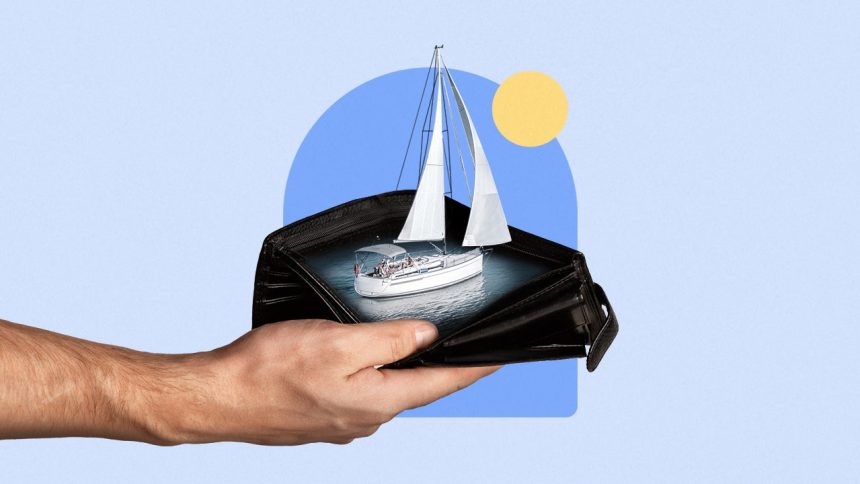Key takeaways
- A boat from the last 10 years of models costs an average of $47,000, while basic models can run around $1,000 or less and yachts can go into the millions of dollars.
- Annual maintenance for the boat costs 10 percent of the boat price on average, but you’ll also have to consider other costs like insurance, storage/mooring, fuel, registration and repairs, as some examples.
- Make sure to choose the boat that works for your budget, usage needs and lifestyle.
- You can find financing through boat, personal or dealership loans.
If you love cruising the open waters, fishing or just docking-and-dining, buying a boat may seem like a great idea. While boat costs vary significantly, you can expect to pay anywhere from $15,000 to $75,000 for the average new vessel, and upwards of $100,000 for a more luxurious model.
Taking out a boat loan can make it easier for you to finance your purchase. However, there is more to the cost of owning a boat than the initial price tag. You must also consider the maintenance costs, boat insurance, fuel costs and potential taxes.
How much does a boat cost?
Boat prices can vary widely depending on if it’s new or what used condition it is in. The type of boat can also affect price drastically. Plus, market conditions can affect boat pricing, much like cars.
For instance, according to J.D. Power, the average retail price of the previous 10 model years for outboard boats was about $47,000 at the end of 2023. At the end of 2021, it was about $53,500. Meanwhile, the last ten model years for inboard boats saw an average price of about $350,000 at the end of 2023, down about $20,000 from two years prior.
How does the type of boat I get impact costs?
The cost of owning a boat differs widely depending on type. For instance, a larger boat will naturally have higher fuel costs to run. Storing a larger boat may also be more complex and costly.
The more expensive and feature-heavy your boat, the more it will cost to insure it. For instance, Nationwide states that faster boats often cost more to insure due to the increased risk. The length, age and type of the boat can also affect how much insurance the boat needs. Your insurance can even be dependent on where you use the boat. Lakes, bays, oceans and rivers all present different safety risks.
Further, a larger and more technologically complex boat could mean higher maintenance and repair costs. There are simply more parts that could break.
Bigger and more expensive boats may also require larger loans and longer loan terms to afford. You will pay more in interest to finance the boat in the long run.
Average boat prices in 2024
Jon boats are among the most cost-effective boat models, while yachts and catamarans are among the most expensive ones.
Affording a boat
The best time to buy a boat is typically in the fall. Most manufacturers start advertising discounts in September or October and continue to do so into the winter months. Purchasing your boat during the off-season could help you cut costs significantly and take on less or no debt.
Even if you find a boat at a discounted price or buy the boat used, you may need help financing it. After all, midsized boats often cost around $30,000, which isn’t exactly pocket change. If you need to borrow money to cover the cost of your boat, there are several options.
The most popular ways to finance your boat are through a boat loan, a personal loan or financing through a dealership.
- Boat loan: These personal loans are designed specifically with purchasing a boat in mind. They typically come with fixed rates so you make the same boat loan payment each month and may use the boat itself as collateral if the loan is secured.
- Personal loan: These fixed-rate installment loans can be used for any purpose, including purchasing a boat. Personal loans tend to be unsecured, so you may not have to use the boat as collateral.
- Dealership loan: These are boat loans that are offered right through a dealership and are convenient because you don’t have to choose your own boat loan lender. However, they may have higher rates, longer terms and require a larger down payment.
Other boat costs to consider
When you buy a boat, you have to consider boat costs like maintenance, potential repairs and the cost of fueling and operating a boat.
Additional costs associated with boat ownership include the cost of storing your boat, the cost of a trailer, safety necessities and miscellaneous items such as water sports equipment.
Boat maintenance and repair costs
Typically, annual boat maintenance costs about 10 percent of the cost of the boat itself. For example, a boat that cost $20,000 to purchase would cost roughly $2,000 a year to maintain.
Examples of typical boat maintenance include:
- Painting the hull.
- Cleaning the deck.
- Replacing broken or worn down parts.
- Winterizing the boat to protect it from the elements during the off-season.
Like cars, boats require regular maintenance to reduce wear and tear.
Fuel and operating costs
You must also consider fuel costs, especially if you have a larger boat. Smaller boats typically just take regular or premium gasoline, while larger vessels may require diesel, which is more expensive.
You can avoid fuel costs if you get a sailboat, which is entirely wind-powered, but most other boats require fuel. You should research the fuel needs of the boat you want to buy before making a purchase.
Additional operating costs for a boat include oil changes, batteries, a pump and lights. Just like a vehicle, these elements should be checked and replaced regularly.
Boat insurance, taxes, certifications and registrations
When you buy a boat, you also have to get boat insurance, get your boat registered and potentially get certified to drive it, depending on the state you live in. Some states also charge boat taxes, so research your local requirements before buying a boat.Here is a breakdown of these costs:
- Boat insurance: It typically costs around 1 to 5 percent of the boat’s value. So, using the example above, the average annual cost of insurance for a $20,000 boat would be between $200 and $1,000 a year.
- Boat taxes: They are required in some states. If your state charges a boat tax, you will have to pay it once a year. There may also be a one-time sales tax when you purchase.
- Certifications and registration: Depending on state requirements, you may need to pay for boat registration, including annual renewal. Your state may also require that you take safety certification courses to operate the boat.
Boating classes
In addition to the certification courses your state may require, you can take a wide variety of boating classes. Formal training with your boat may help lower your insurance payments, but you will also have to budget for course fees. It can be a good investment. Knowing as much as possible about using the boat helps keep you or anyone you take on the boat safe.
If you take boating safety courses through your state or the federal government, fees often range from about $10 to $40 per class.
Beyond introductory and basic safety courses, you might also look into specialized training. You can find courses on navigation, GPS use or waterfowl hunting safety. You might also need specialized training based on the type of boat you get, such as a sailing course if you get a sailboat.
Specialized boating courses might range from $45 from a single-day, online course to far more for a curriculum that’s weeks long. There is also the option for private courses that can happen right on your own boat, but these can run around $500 for a few hours.
Storage and mooring
An important but often overlooked element of owning a boat is properly storing it. Most people do not use their boat year-round, and you have to have somewhere to store your boat during the winter months.
There are a variety of boat storage options. Indoor storage is more expensive because it offers tighter security and you do not have to worry about winterizing the boat to protect it from the elements. Outdoor storage is more cost-effective and can be more convenient in certain climates, but since your boat will be exposed, you’ll likely spend more on maintenance to keep it in good shape.
Storing your boat in your garage or driveway is likely the cheapest option. However, you will likely have to buy a trailer and winterize the boat. Note that Homeowners Associations sometimes have rules about parking boats in driveways, so make sure you are allowed to do so before settling on this option.
Here is a pricing breakdown of the most common boat storage options:
| Dry stack storage | $10-$20/ft/month |
|
|
| Marina storage | $55 and up/ft/month |
|
|
| Self storage facility | Up to $10/ft/month |
|
|
| At home storage | Boat trailer cost: starts at $700 |
|
|
Necessities
In order to get your boat to the water, you need to have a boat trailer and a vehicle that can tow it, such as a truck. These costs can vary depending on the size of your boat.
A boat trailer can range from $700 to over $10,000. In addition to a trailer and a towing vehicle, you must invest in your boat’s required safety equipment. These include:
- A fire extinguisher.
- Enough life jackets for every passenger.
- A flotation device.
- A visual signaling device.
- A sound signaling device.
The exact safety equipment you need can vary by state, but these are the basics.
Having a medical kit and flashlight is also a good idea. Depending on the size of your boat, you may want paddles on board in case your engine quits.
Additional cost considerations
Once you buy your boat, there will inevitably be accessories you want to splurge on that aren’t strictly required.
You may want to invest in water sports equipment, dry bags to keep your valuables safe, waterproof electronics, fishing equipment or other items that make boating more pleasurable. Before shopping, set a budget to limit your spending.
Tips for saving money on boat costs
If you really want to spend your weekends out on the water but don’t have the funds for luxury boating, there are some ways you can reduce boat costs:
- If you find yourself strapped for cash, consider a smaller boat like a jon boat, fishing boat or speedboat.
- To reduce the cost of owning a boat, consider buying a used boat in good condition. For instance, a new current-year Tahoe T16 bowrider is about $27,000. The same model a few years older is about $19,000.
- Buy the boat off-season in fall or winter.
- If you’re taking out a loan, shop around for the best rates, even if that means not taking the loan from the dealership.
- You can also avoid paying interest on a loan by saving for the boat. It’s a luxury purchase and not an emergency. Some split the cost with friends or family and share the boat.
- Use your local state programs for courses and certifications. They tend to be much more affordable than private lessons.
- Work with your insurance for any discounts, such as getting better rates if you take a boater safety course. A clean boating record can mean cheaper insurance. Choose the types of coverage, limits and deductibles that make sense for your boat and budget.
- If you can, store the boat somewhere on your own property to save on marina or storage fees.
- Keep up on regular boat maintenance and care to reduce the risk of costly repairs.
- Consider fuel costs. Larger boats may need more expensive diesel fuel. If you want to really save on fuel, opt for a sailboat.
- See if you can get boat accessories and equipment, such as trailers, used and in good condition or on sale.
- Renting a boat can get you out on the water without the added costs of storage and upkeep.
The bottom line
Buying a boat is an exciting adventure, but it is also costly and time-consuming. There are so many extra boat costs beyond the buying price. You must stay on top of maintenance and repairs to keep your investment ship-shape.
Before buying a boat, consider all these costs and write a cost estimate/yearly budget. It is important to ensure you can handle all of the costs associated with having a boat before buying one.
Choosing a financing option like a boat loan, personal loan, or dealership financing could help you plan some of the costs. However, you can avoid taking out a loan by saving up instead, buying a used boat for a lesser cost or splitting the cost and sharing the boat with a trusted friend or family member. You might also look into renting a boat if owning a boat is too expensive.
Whichever option you choose, make sure that you do your research and come up with a plan before making any decisions.
Read the full article here
















